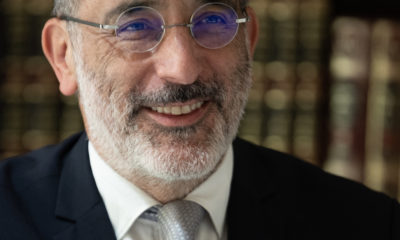
Banner

Imagination and responsiveness keep our shuls vital, says chief rabbi
South African Orthodox rabbis and rebbetzins focused their energy at the first in-person SA Rabbinical conference since 2019 on ensuring that South Africa’s proud network of shuls rebound from the COVID-19 pandemic and remain at the centre of Jewish life in the country.
A number of sessions were about formulating strategies to improve the shul experience and, as Chief Rabbi Dr Warren Goldstein puts it, “reimagining what our shuls can be”.
“We need to expand our concept of a shul. What emerged from the discussions is that a vibrant shul comes from being responsive to the needs of our community, meeting people where they are.
“A shul isn’t just about prayer services, it’s a communal hub; a place where we gather as families; a warm, vibrant, welcoming space for people to connect and be inspired. It’s where we develop our capacity to volunteer and reach out to others; to give and grow.”
South Africa’s rabbis and rebbetzins gathered at the Kruger Gate Hotel in Mpumalanga last week for a vital and productive conference.
The chief rabbi, who convenes the annual rabbinical gathering, shook up the traditional format to include rabbis and rebbetzins.
“During COVID-19, our rabbis and rebbetzins faced unprecedented challenges in the work of serving their communities – emotionally, financially, and spiritually,” said Goldstein. “They’ve given of themselves around the clock, sparing no effort – giving shiurim, comforting the bereaved, visiting the sick, and counselling those in need of advice and direction.
“Besides the vital brainstorming, this conference was a way of investing in their spiritual and emotional well-being, giving rabbinical couples an opportunity to relax and rejuvenate in the wake of a pandemic that pushed many shuls and their leaders to breaking point.”
Rabbi Dani Brett, who chaired a session on Torah learning in shuls, believes it’s essential for shuls to find creative ways of facilitating that learning by providing platforms that appeal to different ages, backgrounds, interests, and lifestyles.
“To a large extent, the vibrancy and dynamism of our community is entwined with that of our shuls,” said Goldstein. “The challenges are mounting, and we need to respond proactively, promptly, and creatively if we’re to ensure that our shuls remain the beating heart of our special community.”
The role of women in the renewal of shuls featured prominently in these discussions. “One of the main reasons for including the rebbetzins in this year’s conference is the recognition that the women of our community are vital partners in the vision of renewing and strengthening our shuls,” said the chief rabbi.
Youth featured high on the agenda, with discussions about how to attract this elusive demographic to shul. To this end, Rabbi Ricky Seeff presented the findings of a recent survey of pupils at King David School.
“While the students are worldly and are confronted by the many challenges presented by an increasingly global world, they remain predominantly proud to be Jewish and proud to be associated with Israel,” said Seeff. “They have a connection to the Jewish people and Jewish spirituality in general – all solid indicators that the Jewish future of our community is bright if we seize the opportunity to build on this foundation and inspire them further.”
“We need to be real about the state of our community – there are imposing challenges and concerns, and we need to confront them directly, not shy away from them,” said the chief rabbi. “But there are also growth opportunities we can seize and considerable strengths we can build on.”
In terms of the latest developments in the kosher department, there has been national integration between Cape Town and Johannesburg, enabling the utilisation of shared resources and lowering costs.
Other recent developments include a series of upgrades and improved efficiencies in shechita and meat production, a new system to facilitate a smoother and more coherent relationship with mashgichim, and a renewed partnership with retailers Pick n Pay and Woolworths to introduce new kosher products into the market.
“With the help of our partners, we’re bringing more than 30 new products online each month,” said Kosher SA Managing Director Rabbi Dovi Goldstein. “Our goal is to encourage more people to keep kosher by ensuring that keeping kosher is as easy as possible.”
At the Beth Din, the team reported on the recent uptick in mediations and arbitrations, and the introduction of a new systemised process to track every case and ensure nothing falls through the cracks.
“We’re hearing that claimants can’t get civil court dates for three years, which is perhaps why the Beth Din is being seen as a more efficient and cost-effective way to resolve monetary disputes,” said Rabbi Shmuel Slasky, the Beth Din’s new rabbinical director, who alongside the new case manager, Charmaine Campbell, has helped drive improved efficiencies at the Beth Din.
Some of the new Beth Din projects on the go include the introduction of a mikveh certification programme and an eruv maintenance project to ensure that these vital institutions of halachic practice maintain the highest standards.
But amidst all the brainstorming, strategising, and serious discussion, for Goldstein, the team building aspect of the conference was paramount. “Of course, there are important things to discuss, but the real impact is the bonds of friendship that are forged and reinforced. It’s these bonds of friendship that build the unity of our rabbinate and hold us together as a community, and it was heart-warming to reconnect with each other.”








